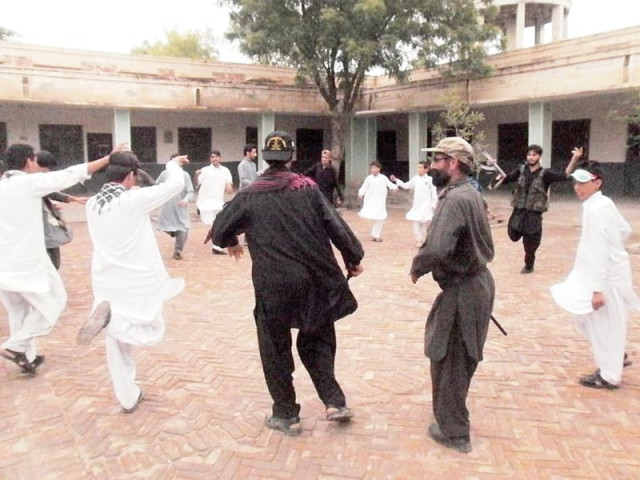Dampened enthusiasm: For tribesmen in FATA, independence came at a cost
66 years on, people in parts of the country still deprived of basic rights, provisions.

Levies force personnel dance with children during a ceremony on Independence Day in South Waziristan. PHOTO: ONLINE
The 66th Independence Day of Pakistan was celebrated with zeal and fervour in most parts of the country, but many people in the tribal belt lamented lost freedom.
Political administration officials and influential elders observed the day in agency headquarters across the Federally Administered Tribal Areas (Fata). However, tribesmen in far-flung areas recounted the days of yore, when their forefathers valiantly fought for independence for a better future – one that is yet to materialise.

Gul Muhammad, a Pashto poet and journalist based in Mohmand Agency, said independence for these tribesmen came at a heavy price. “Before [independence], people were free to live according to their tribal customs, traditions and jirgas as British rule was restricted to big cities. They (the British) were afraid to enter villages and tribal areas so they ruled through the jirga system which was acceptable to the people,” said Muhammad.
He said after independence the Quaid-e-Azam withdrew all security forces stationed in the tribal belt and people continued to live according to their wishes. However, after the Quaid’s demise, political administration officials from Peshawar and other metropolitan cities shifted their offices to tribal agencies and started to govern the area.
“The old system was destroyed by the political administration and paramilitary forces, and new reforms were not introduced to replace it.”
Muhammad said old hujras and community centres were demolished and protests were restricted by arresting elders and putting them behind bars. He maintained a majority of the tribesmen migrated from the area, while “about 800 elders were killed by unseen forces.”
Muhammad claimed schools and health institutions were also destroyed and people were deprived of their basic rights. “Only administrative development was seen in Fata; human development is just a dream for tribal people, which is why August 14 is not being celebrated in such areas.”
Pakistan Muslim League-Nawaz leader from Fata, Malik Nisar Khan said tribal people are still not independent. He claimed though the last general elections were held on party basis, the polls were not free and fair.
Khan alleged old stalwarts were elected instead of political workers as the tribesmen are bound to obey their elders who have deep roots in the administration set-up.
“After September 11, 2001, the war on terror was imposed on us and hundreds of our elders were killed while thousands migrated from Fata and are now living in exile. Our own parliamentarians have no rights of legislation in their respective constituencies.”
Demanding human rights, education and basic health facilities, Khan said the tribal people were still patriots and would stand in the front line against any external aggression. He also demanded reforms in the Frontier Crime Regulation and political freedom for the oppressed tribesmen.
Published in The Express Tribune, August 15th, 2013.













COMMENTS
Comments are moderated and generally will be posted if they are on-topic and not abusive.
For more information, please see our Comments FAQ